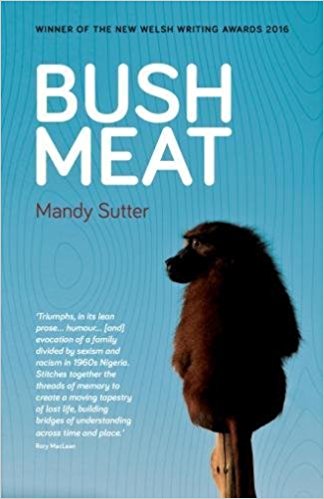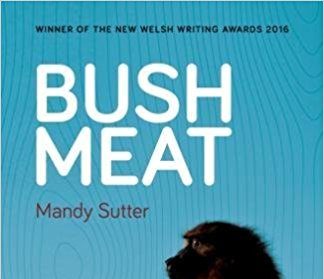
Literature Reviewer Sophie Baggott reviews Bush Meat, an ebook by Mandy Sutter who was the winner of the New Welsh Writing Award in 2016.
Bush Meat did not inspire love at first click. The definition of ‘bushmeat’ (usually one word) is ‘meat obtained by hunting wild animals, especially in Africa and Asia’. Where was the author, Mandy Sutter, going with this title? Who were the hunters, who the hunted? Why was such a Western name behind stories of Africa?
If this review is a little jumpy – lurching, ill at ease – it may be down to two reasons.
First, Bush Meat is a jigsaw with half the box missing. The ebook is made up of many stories, many voices; Sutter drops a handful of puzzle pieces onto the table as if offering specks of characters’ lives but gives nothing resembling a complete picture.
Fleetingly we meet a wild scattering of individuals, including a fragile teacher in a fluster, a barren ‘grandmother’, and an elderly lady plagued by paranoia mixed with prejudice. Stories are knotted together, sometimes tenuously, with nothing happening in sequence. Sutter’s boomerang is a family, returning often to the tales that follow the eponymous opening chapter. Bush Meat, which won the New Welsh Writing Award 2016, immediately zeroes in on a British household in Nigeria: a woman, husband, child, and servants.
The second reason for a jumpy review? Discomfort is the emotion du jour in Bush Meat. From the off, Maureen, Jim and their daughter Sarah are far from representing a ‘unit’; they are three isolated individuals. The physical setting of stories zigzags between Britain and Nigeria, but an atmosphere of tolerance for a life lived dissatisfied consistently prevails. No one seems happy in Bush Meat. The family splinters eventually but characteristically the facts emerge obliquely, selectively.
Most of Bush Meat’s unease germinates in gaps between people, frequently due to different backgrounds, but also between immediate relatives. I think, in fact, all individuals are the bush meat – everyone is stalked by something or other, frequently self-inflicted.
Back to the primary characters: living in Africa for Jim’s engineering job, Maureen is miserable with the status quo. Sutter presses the notion that this housewife resents the apparent obligation to hire servants, ladling signals of this resentment into the narrative. Even so, Maureen’s pity for an impoverished child who comes to the door advertising his services leads her to welcome him into the home as a chef – albeit a totally inept one.
Towards the end of Bush Meat, one line encompasses the feeling that dominates the ebook: “Their faces were landslides of disappointment, held back by the foundation, faint hope, fixed smiles; lines led to their mouths.” The faces are those of women hunched, smoking, by a door outside an addiction clinic. It’s a compelling mesh of the stiff-upper-lipped despondency that afflicts the people we encounter.
Sutter does not duck away from contemporary concerns in the UK. Racism raises its ugly head again and again. One of the most powerful stories, ‘When My Doorbell Goes’, is a first-person account of a seemingly frail Brit, hampered by DVT (or “deeveetee”), apparent dementia, and certain bigotry. A black man comes to her door offering his services as a cleaner, echoing the titular story, and she is dumbfounded with distrust.
Obsessed with the idea that he wants to steal the cash she has hidden beneath her floorboards, she nonetheless hires him (after a while) to clean for her. Over time, the fear subsides ever so slightly and her chronic loneliness becomes clearer. Yet this story’s close is bleak and entirely believable: her prejudice flares as she has a fall. “Did he push me?”. Despite the man’s kind generosity, her paranoia fills every edifice. “I get the feeling there’s more of them on the doorstep, waiting to come in.”
Threaded into ‘When My Doorbell Goes’ is a grown-up Sarah, dropping in now and again to care for the narrator – who happens to be her neighbour. When Sarah finds out the cleaner is from where she grew up in Nigeria, her interest and empathy is palpable. It’s a stark contrast with the distaste that child-Sarah displays for the corresponding boy-chef at the start of Bush Meat; Sarah’s character development is one of the most fascinating aspects of the ebook.
Naivety and worldliness counterbalance each other throughout, sometimes hand in hand with teachers and pupils. Environments of education crop up in several stories, whether at schools, studies abroad, or an addiction clinic. One example is a posh, wide-eyed British teacher who catapults himself into Nigeria to “show the boys how individuals could shape history” and that “what happened in these early years could define the future”. His white saviour complex does not wash with the African school kids, who don’t indulge his desire to get them debating as if lauding it at an English public school. “Sa, I do not have opinions”, says one. He instead lectures them on “World Literature”.
As Sarah grows, she’s infused with more and more cynicism – juxtaposed, in one story, with an English-born-and-bred peer’s bubble-wrapped existence. In ‘Mobylette Dreams’, Sarah has inherited her parents’ misery, which manifests itself as cruelty. Sutter has no hesitancy in highlighting her main characters’ flaws, which is somewhat refreshing in an age of shiny, self-promoting social media. Sarah’s cynicism bares its roots in surrounding stories.
Her father’s demons begin taking shape in the stories that follow the first. “Jim had sunk into a dark world of his own”, Sutter writes at one point. Sarah endures an agonising visit with him later in the ebook, almost holding her breath until the moment she can rush back to her own world. Towards the end of the conversation, her phone pings with a photo of her cat, Tumfy, “a reminder of my world”. This image struck a resounding chord with me, and perhaps would with any reader who has two universes – a past and a present. “I’m heartsick; I’m saved. The world is full of movement,” Sarah says.
So it may not have been love at first click, but what about by the final flick onto the last page? Bush Meat is pierced with moving insights – an arrow to the heart at times, but its structure does little to transfix. Gathering a collection of stories has become fairly trendy these days; an ebook is perhaps not the best format when it might already prove a struggle to invest in characters who only appear sporadically.
Put it this way: “Are you sitting comfortably?” is not a concern for Mandy Sutter. Rather, Bush Meat gets you discomfited – and, though it might not be instantly obvious, I think it’s for a good cause.
Bush Meat by Mandy Sutter is available now.
Sophie Baggott is a regular contributor to the Wales Arts Review.












